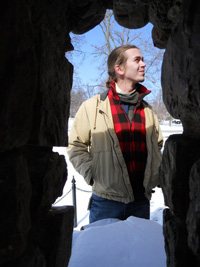Honors drama student Will Eubanks was able to cut tech cues by almost half in a recent campus production of Shakespeare’s Othello – thanks to research supported by an Honors College undergraduate research grant. He reports on the project below:
Over the course of the Spring 2011 semester, I researched the application of MIDI Show Control in theatrical productions, namely using it to synchronize light and sound technologies. In essence, this simplifies the show-calling process so that only the sound operator is needed to control nearly every technological event that occurs throughout the course of a show, using only a spacebar to fire each cue. Because a show requires, on average, anywhere from 3-4 events per script page, it is easy to see why condensing all of them into the control of one operator is massively helpful to the production.
My research culminated in implementation for the recent University Theatre production of William Shakespeare’s Othello. Overall, the research was rather successful, and the implementation went off without a hitch, cutting down what would have been over 450 cues to nearly half of that – around 230. This successfully allowed the stage manager to limit the number of her calls and gave her more time in between them to feel out the rhythm of the show, since timing is so crucial to any live production and it is never the same every night. The only issue I ran into in the process was that because MIDI signals are sent at such low voltages (generally around 5v) and the length of the MIDI cable carrying the signal was over 100′, I feared voltage drop could interfere with a steady communication between the MIDI output device and the MIDI control, i.e. the light board. To solve this problem, I planned to use a simple voltage booster, but luckily, the problem never arose.
The next production which I will be working on is the Fall 2011 production of Bridget Carpenter’s Up. For this show, I plan on using MSC technology again, this time hopefully synchronizing more aspects of the show, including microphone mute sequences, sound effects loops, and possibly fog or other stage effects. In fact, I cannot see myself working on another show in which I do not use this technology for some time. This research has greatly furthered my ability to work in professional-level theatre and, as a whole, has taken the University Theatre one step further into the future of technical theatre.

